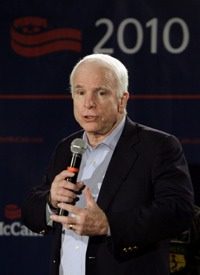
A leopard may not be able to change its spots (or "its stripes," as former Vice President Al Gore once said), but John McCain is hoping to prove an old political warhorse can throw off his "maverick" image.
McCain, the 2008 Republican presidential candidate, is now seeking a fifth term as U.S. Senator from Arizona and faces a spirited challenge from fellow Republican and former Congressman J.D. Hayworth, who has vigorously criticized the incumbent for departing from Republican orthodoxy on issues ranging from taxation to immigration. McCain, who appeared to relish the maverick label during his presidential bids in 2000 and 2008, now claims he never thought of himself that way.
"I never considered myself a maverick," he said in an interview with Newsweek magazine. "I consider myself a person who serves the people of Arizona to the best of his abilities." But as CBS News recalled on its website, McCain’s presidential campaign ran an ad in 2008 calling the candidate the "original maverick." Another spot described McCain and running mate Sarah Palin as "the original mavericks." Campaigning for the Senator in March of this year, Palin repeatedly urged Arizona voters to "send the maverick back to the U.S. Senate." At a town-hall meeting in Michigan in ’08, McCain said, "Sarah and I don’t agree on everything, but what do you expect of two mavericks?" McCain referred to himself as a maverick in an appearance on Saturday Night Live before the election. And the label appears in the subtitle of an autobiographical book he authored: Worth the Fighting For: The Education of an American Maverick, and the Heroes Who Inspired Him. As Jon Stewart on Comedy Central characterized McCain’s effort to distance himself from his once cherished brand, "It would be like Rudy Giuliani saying ‘I never mentioned 9/11. I don’t know what you are talking about.’"
McCain, 73, is at an advanced age for an identity crisis. But in the Republican primary, the maverick label could be a liability, since it reinforces Hayworth’s theme that McCain has been willing to break ranks and join with the Democrats on issues like immigration reform and in his votes against the Bush tax cuts in 2001 and 2003. And it plays into the charge that anyone who likes McCain’s stands on the issues should be advised that they are subject to frequent change, in what Hayworth calls "the Johnny Mac shuffle." In contrast to McCain’s maverick image, Hayworth has labeled himself the "consistent conservative." He has branded McCain "border-line delusional" on illegal immigration for having cosponsored with the late Sen. Edward M. Kennedy a bill that would offer illegal aliens a "path to citizenship," requiring them to pay a fine for their illegal border crossing while allowing them to continue to live and work in the United States. McCain later voted against the plan when the "amnesty bill" generated such intense opposition that it became an obstacle to his 2008 presidential bid. He also came out in support of the Bush tax cuts that he originally opposed. Hayworth has also knocked McCain for supporting the massive bailout of the financial industry with the Troubled Assets Relief Program, for his contributions to the $12 trillion national debt and for supporting embryonic stem-cell research. And he scoffs at McCain’s charge that the federal government has failed to secure the nation’s borders.
"With 28 years in Washington — and most of that time as the darling of mainstream media — I don’t think he’s powerless to get anything done," Hayworth says on his website. "I think he’s unwilling. He doesn’t want to lose that darling status."
But even Hayworth prefaces his attacks on McCain with an acknowledgement of his hero status as a Navy pilot who endured five and a half years as an unwilling guest at "Hanoi Hilton" during the Vietnam War. And he speaks not of kicking the incumbent out of office, but of "welcoming him home." That’s still a long shot, since McCain has the support of all the major Republican elected officials in the state, as well as the state’s leading newspaper, the Arizona Republic. He has been endorsed by leading figures in the current crop of GOP presidential hopefuls, including Palin, Minnesota Governor Tim Pawlenty, and former Massachusetts Governor Mitt Romney. And despite his crusades against the "corrupting influence" of money in politics, the co-author of the McCain-Feingold Campaign Reform Act (key provisions of which have been judged unconstitutional by the U.S. Supreme Court) has raised millions of dollars to get himself reelected.
Yet as familiar a figure as John McCain is, both to Arizona voters and the nation’s political and media elite, few, if any, claim to really know him. As Newsweek’s David Margolick wrote: "How much of his maverick persona over the years has been real and how much simply tactical? Is he in the midst of some struggle for his soul, or is this evolution simply the latest example, dating back to his days at the Hanoi Hilton, of McCain doing whatever it takes to survive? Is the anger people sense in him anger at Obama, or the American electorate, or fate, or himself? And if, as seems likely, John McCain goes on to serve another term, which John McCain will it be?" Hayworth claims to know the answer to that last question.
"It’ll be a lead-pipe cinch," he said, "that John will go back to being John, and taking delight at poking conservatives in the eye."



